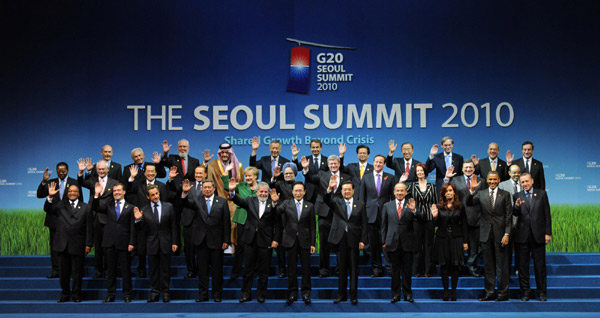Latest News
G20 summit agrees on trade, currencies
(Xinhua)
Updated: 2010-11-12 17:00
 |
Large Medium Small |
SEOUL - The G20 countries said they would enhance multilateral cooperation to promote external sustainility and pursue policies conducive to reducing trade imbalances and maintaining trade imbalances at sustainable level, said the joint communique issued Friday afternoon at the end of the Seoul Summit.
The G20 countries agreed to develop indicative guidelines composed of a range of indicators, which would serve as a mechanism to facilitate identification of large imbalances that required preventive and corrective actions, it said.
 Leaders of the G20 countries pose during a family photo session at the G20 Summit in Seoul Nov 12, 2010. [Photo/Xinhua] |
The communique said the Framework Working Group, under the G20 leadership, would be responsible for developing these indicative guidelines, with progress to be discussed by G20 finance ministers and central bank governors in the first half of 2011.
The G20 countries have also agreed to move toward more market-determined exchange rate systems and enhance exchange rate flexibility, according to the joint communique.
The G20 countries agreed to refrain from competitive devaluation of currencies, it said.
But when G20 countries are facing undue burden of adjustment, policy responses in emerging market economies with adequate reserves and increasingly overvalued flexible exchange rates may also include carefully designed macro-prudential measures, said the communique.
Advanced economies, including those with reserve currencies, will be vigilant against excess volatility and disorderly movements in exchange rates. "Together these actions will help mitigate the risk of excessive volatility in capital flows facing some emerging market economies," it said.
Over the monetary and exchange rate policies, "we affirm the importance of central banks' commitment to price stability, thereby contributing to the recovery and sustainable growth," it said.
The G20 Seoul Summit has confirmed the 6-percent shift of quota shares to emerging economies in the International Monetary Fund, according to the joint communique.
"Today, we welcomed the ambitious achievements by the Finance Ministers and Central Bank Governors at the Gyeongju Meeting and subsequent decision by the IMF, on a comprehensive package of IMF quota and governance reforms," said the communique.
The reform are an important step toward a more legitimate, credible and effective IMF, by ensuring that quotas and Executive Board composition are more reflective of new global economic realities, it said.
The IMF reform, it said, would continue the dynamic process aimed at enhancing the voice and representing of emerging market and developing countries, including the poorest, through a review of the quota formula by January 2013.
And the next general review of quotas would be completed by January 2014, it said.



